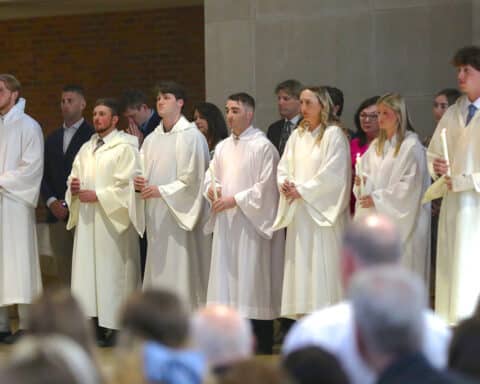In any introductory theology class, students are introduced to St. Anselm’s classic definition of theology as fides quaerens intellectus. Most of us actually know more Latin than we think we do. Fides (faith) shows up in the classic name for man’s best friend, Fido — that is, faithful one, or in fidelity, faithfulness. Quaerens is at the root of querying, seeking. Intellectus is pretty straightforward. We know about intelligence. Here we are talking about intelligibility or, as the standard translation puts it, understanding.
It is commonly asserted by the critics of religion, and occasionally even affirmed by the religious themselves, that faith is a kind of believing without reason, or even over and against reason. Now, it is true that there are certain kinds of things that we believe without having reasoned our way to them. But that is not unique to religious folk. It is, rather, basic to the human condition. As creatures that lack omniscience, we must occasionally take a leap and then assess the results of that leap after the fact. This is necessary across a whole range of human experience, from love to war. In science, this is called a hypothesis. And making one is far from unreasonable.
What is unreasonable is refusing to look honestly at the results of one’s leap to consider whether the hypothesis needs tweaking or scrapping. It is precisely this conviction, that those things affirmed by faith remain subject to rational scrutiny, that has led to the development of Christian theology. Christianity has always insisted upon the reasonability of its claims.
Some Christian beliefs, like the existence of God, for example, can be demonstrated rationally. But other kinds of claims work differently. Claims about events in history, supernatural or otherwise, cannot be reasoned to in a strict sense. But they can be reasoned about. We cannot straightforwardly deduce that Julius Caesar crossed the Rubicon from first principles, but we can sift through claims and sources and alternative explanations and then affirm that which strikes us as most reasonable. Historical knowledge is different from the knowledge gained from logical deduction, though both require a kind of faith. While logical deduction requires faith in reason itself, and in our own capacity to reason, historical knowledge also requires faith in our sources it requires that we trust.
Both faith in reason and faith in historical sources are examples of what is sometimes called natural faith. And it is important to recognize that Christian faith, while like natural faith in important ways, is also unique. It is not simply unavoidable the way natural faith is. Instead, it is a gift. And the content of that gift is trust in God. And so, while God’s existence is deducible by reason, God’s nature as Trinity can only be known because God has revealed God’s inner life to us through the incarnation of Jesus and the sending of the Holy Spirit. Christian faith trusts in God’s self-revelation. And, though the content of such revelation cannot be reasoned to, it can be reasoned about. Anything Christian theology says about the Trinity must be coherent. We do not, as some suggest, revel in absurdity. For Catholics, faith and reason never come into contradiction.
If, as sometimes happens, reason and faith seem to be at odds, Catholics are not asked to opt for one over the other, but we are instead invited to explore the claims of our faith and the process of our reasoning more deeply. We may find our reason has erred, or that our apprehension of the claim of faith was confused. Or both. When we honestly pursue the questions that arise when faith and reason look incompatible, this often leads to breakthroughs in our understanding and a deepening of our faith. When we avoid such questions because they make us uncomfortable or, worse, because we have been given the impression that to do so is somehow unfaithful, our faith becomes shallow and brittle, unable to face up to reality, and certainly unable to be shared with confidence and joy.
In as much as every human person naturally seeks to understand what their basic stance toward reality means for their lives, their societies, their decisions or their relationships, every Christian is a theologian. Each of us have times and places where what we believe in faith presents us with a question that deserves our attention. Far from discouraging such questions, the tradition of theology encourages them. It is right and just that faith should seek understanding.
In offering this column, and in all my work as a theologian in the Church, I want to affirm the value of honest questions in the Christian life. My own faith has benefited immensely from such questioning. And my heart grieves when I hear stories of those whose faith was strangled when they were given the impression that asking questions indicated a lack of faith. These people should have been pointed to the Annunciation, where Mary, confronted with a startling claim, honestly asked, “How can this be?” The honest questioner stands in a venerable tradition.





